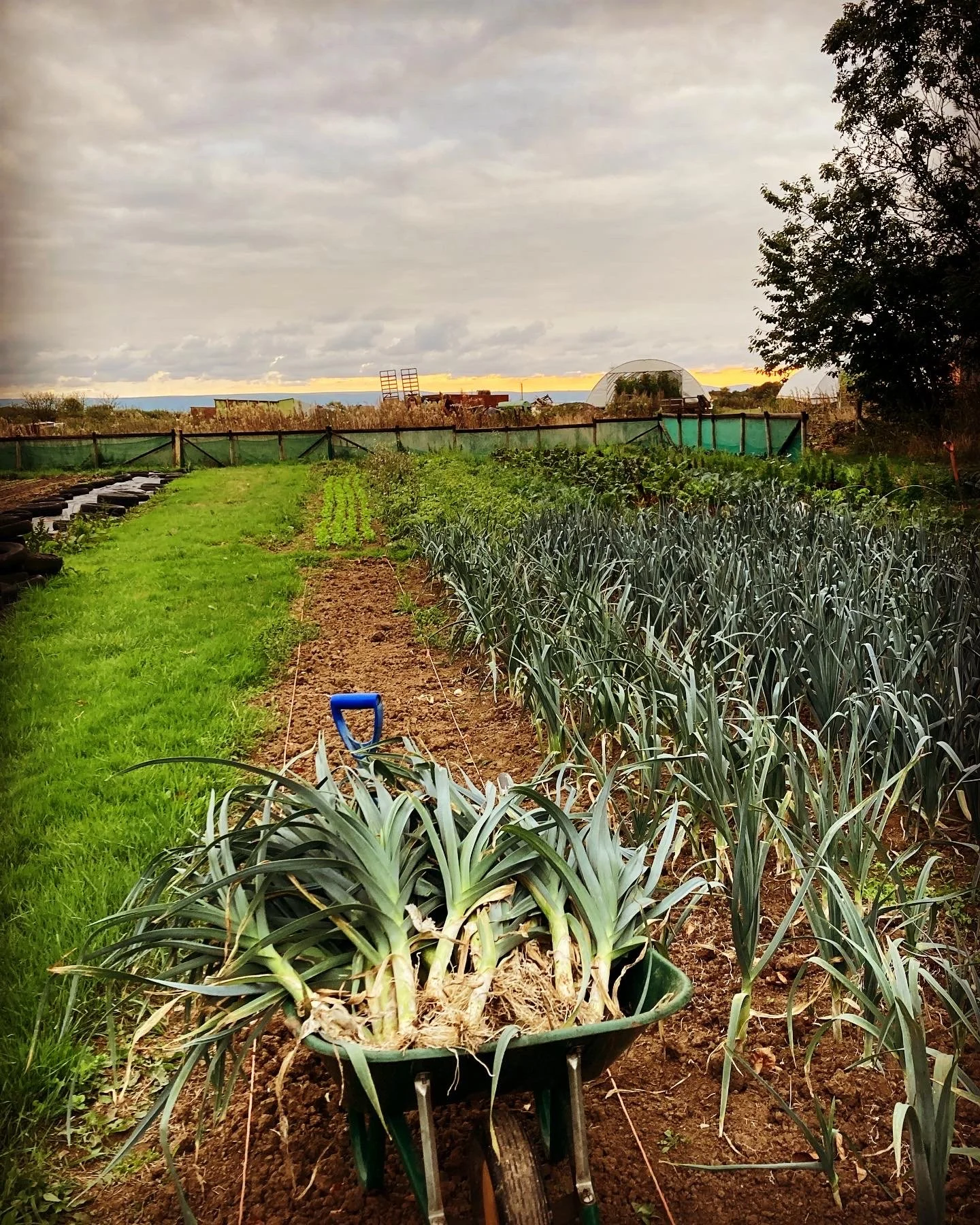In 2021, we set about evolving our veg scheme to incorporate accessibility. The Accessible Veg Project was set up in collaboration with some academics who are long term friends of the farm. The project, organised by T-Grains, received financial assistance from UWE Bristol, Cardiff University, WWF Cymru and Food Sense Wales. Born from the collaboration between researchers, Community-Supported Agriculture (CSA) farms, and food aid partners, this project aimed to bridge the gap between food-insecure households and nutritious vegetables.
Please note, Community-supported Agriculture (CSA) farms are part of an agroecological model. People, planet, and producer are at the core of this value system.
The Accessible Veg Project
What we wanted to do was integrate households that might not usually access our veg scheme into our local CSA. These schemes, usually accessible to paying members, offer a weekly assortment of fresh vegetables during the harvest season. However, for some that may not be possible, due to costs of other factors, we wanted to challenge that.
For the trial period funding of the Veg bags came from the research resources. However, CSA participants needed to explore different, sustainable ways to fund the cost of the bags once the project period ended. (Read on to discover how Slade Farm Organics achieve this).
Fresh organic vegetables are important to all in promoting health and well-being, The Accessible Veg Project sought to make that resource accessible to all. Through the project, participants received weekly veg bags free of charge, or for a small contribution, accompanied by informational resources, recipes, and opportunities for farm visits and volunteering.
Cultivating Community
We were making it up as we went along, in many ways, so proper evaluation was really important. Pre- and post-veg bag interviews with participants provided valuable insights into the impact of CSA membership on diets, food security, and overall well-being. Although the dropout rate underscored existing barriers to accessibility, the project remained committed in its dedication to the overall challenge. Splice Child and Family Project stated, ‘We have provided delivery to each family, many do not have transport and would find it hard to access the farm to collect their veg boxes.’
The project was never just about vegetables however, but about building and nurturing a sense of community. Learning more about what was going on at the farms and how vegetables are grown, through various forms of communication, many participants reported feeling connected to the cause of the farm. Indeed, they felt like they were part of the community.
The Accessible Veg Project Findings
In a report written by Dr Caroline Verfeurth and Dr Angelina Sanderson Bellamy the impact of the project on the lives of participants proved extremely positive. In addition to receiving access to fresh produce, participants in the project working with the CSA farms felt connected to a larger cause, even if they could not visit the farms themselves. Following the Covid-19 pandemic, in a world where loneliness levels continue to rise, participants became part of a community. Whether they engaged with the delivery personnel or participated in group chats on social media platforms, they felt a sense of belonging and solidarity.
Likewise, receiving a weekly veg bag improved the food insecurity of participants. Fewer participants found it difficult affording their weekly food shop. Fewer participants went hungry or skipped meals. Indeed, receiving the veg bag significantly improved the well-being of participants. For the full report findings, please click here.
Where Do We Go from Here?
One of the project's pivotal moments was the workshop convened with CSA and charity partners. Here, stakeholders shared their experiences and explored avenues for sustainable collaboration. CSA farms, including Ash and Elm Horticulture, Galsbren, Henbant, and Slade Farm Organics, showcased their commitment to fostering solidarity and inclusivity within their communities. Partnering with local charities such as Splice Child and Family Project and Siop Griffiths further amplified the project's reach and impact.
Slade Farm Organics continues to work with Splice Child and Family Project to provide the Accessible Veg Project to our local community. Funding for the project comes from the paid weekly veg bag scheme itself. Weekly veg bags cost between £18 - £23. Our aim is to target an average cost of £20 per bag. Therefore, any excess payments received for our organic weekly veg bags by wealthier households, is then used to fund the veg bags for the lower income families. A true sense of community! So, if you wish to order a weekly Organic Veg back and learn more about our scheme, please click here.
Conclusion
The legacy of The Accessible Veg Project serves as a beacon of hope and possibility. Its success demonstrates the transformative power of collective action and underscores the importance of centring community voices in efforts to address food insecurity. As we continue to cultivate connections and cultivate change, may we draw inspiration from initiatives like The Accessible Veg Project to sow a future where nutritious food is truly accessible to all.


